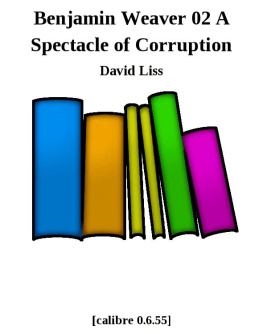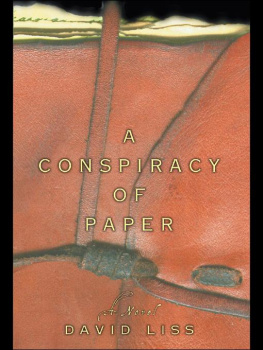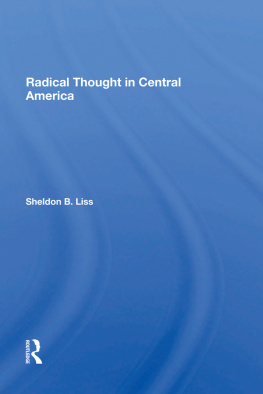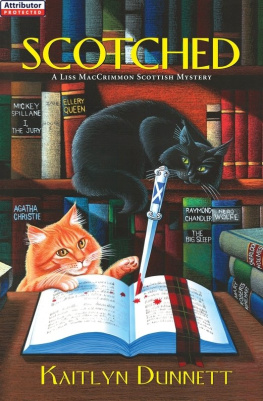David Liss - A Spectacle of Corruption: A Novel
Here you can read online David Liss - A Spectacle of Corruption: A Novel full text of the book (entire story) in english for free. Download pdf and epub, get meaning, cover and reviews about this ebook. year: 2004, publisher: Random House, genre: Adventure. Description of the work, (preface) as well as reviews are available. Best literature library LitArk.com created for fans of good reading and offers a wide selection of genres:
Romance novel
Science fiction
Adventure
Detective
Science
History
Home and family
Prose
Art
Politics
Computer
Non-fiction
Religion
Business
Children
Humor
Choose a favorite category and find really read worthwhile books. Enjoy immersion in the world of imagination, feel the emotions of the characters or learn something new for yourself, make an fascinating discovery.
- Book:A Spectacle of Corruption: A Novel
- Author:
- Publisher:Random House
- Genre:
- Year:2004
- Rating:3 / 5
- Favourites:Add to favourites
- Your mark:
- 60
- 1
- 2
- 3
- 4
- 5
A Spectacle of Corruption: A Novel: summary, description and annotation
We offer to read an annotation, description, summary or preface (depends on what the author of the book "A Spectacle of Corruption: A Novel" wrote himself). If you haven't found the necessary information about the book — write in the comments, we will try to find it.
A Spectacle of Corruption: A Novel — read online for free the complete book (whole text) full work
Below is the text of the book, divided by pages. System saving the place of the last page read, allows you to conveniently read the book "A Spectacle of Corruption: A Novel" online for free, without having to search again every time where you left off. Put a bookmark, and you can go to the page where you finished reading at any time.
Font size:
Interval:
Bookmark:
A SPECTACLE OF CORRUPTION
A Novel
David Liss
RANDOM HOUSE
NEW YORK
Leading Up to the 1722 General Election164249 Englands civil wars are fought between the Royalists in support of Charles I and the Parliamentarians, who rebelled against the kings Catholic leanings and sought to instill a government based on radical Protestant ideals.1649 King Charles I is executed.164960 During the Interregnum, Oliver Cromwell and later his son, Richard, lead the nation, along with Parliament.1660 The Restoration of the Monarchy, the army supports the return of Charless son, Charles II. The new king is a declared Protestant but is suspected of having Catholic leanings.1685 Upon Charles IIs death, his openly Catholic brother, James II, becomes king. James has two Protestant daughters from a previous marriage but is now married to Mary of Modena, a Catholic.1688 Mary of Modena gives birth to a son, also named James. Parliament, fearing the beginnings of a new Catholic dynasty, invites William of Orange, husband of Mary, the kings elder daughter, to take the crown jointly with his wife. James II flees, and Parliament declares that he has abdicated.1702 Anne, James IIs younger daughter, becomes queen.1714 In accordance with Parliaments Act of Settlement, on the death of Anne the crown passes to the Elector of Hanover, Annes distant German cousin, who becomes George I.1715 The first significant Jacobite uprising, headed by James Stuart, son of James II and now known as the Pretender.1720 The South Sea Bubble collapses, causing the first stock market crash in England. As a result of corporate greed and Parliamentary complicity, the country falls into a deep economic depression. Jacobite sympathy grows.1722 The first general election since George became king takes place and is widely viewed as a referendum on his kingship.Key Political TermsTories The Tories were one of the two key political parties. They were associated with old money, the landed wealth, a strong Church, and a strong monarchy. They vigorously opposed changes to the law that would aid nonChurch of England Protestants, and especially Catholics and Jews. Following the accession of George I, the Tories were effectively barred from power.Whigs The second important political party, the Whigs, were associated with new landless wealth, the stock market, nonconformist Protestantism, divesting power from the Church, and Parliamentary power over royal power.Jacobites Those who believed that the crown should be restored to the deposed James II and, later, his heirs were called Jacobites (from Jacobus, Latin for James). Jacobites often masqueraded as Tories, and Tories were often suspected of having Jacobite sympathies. Scotland and Ireland were strong centers of Jacobite support.Pretenders The deposed James II and, later, his heirs were known as Pretenders. The Pretender in this novel is James Stuart, the would-be James III, son of James II. He was also known as the Chevalier.Franchise Who was permitted to vote in eighteenth-century Britain and who was not can seem a very complicated issues to modern readers. Election districts were composed of two units: boroughs and counties. To vote in one of the counties, a person needed an annual income from property equaling forty shillings or more a year (an amount that had seemed like significant wealth when the law had been written, three hundred years before the events of this novel). Condition for election varied from borough to borough. Some had wide franchises, some were composed of a small body of men who met in private and voted among themselves. In rural communities, farmers were generally expected to vote as directed by their landlords.
Font size:
Interval:
Bookmark:
Similar books «A Spectacle of Corruption: A Novel»
Look at similar books to A Spectacle of Corruption: A Novel. We have selected literature similar in name and meaning in the hope of providing readers with more options to find new, interesting, not yet read works.
Discussion, reviews of the book A Spectacle of Corruption: A Novel and just readers' own opinions. Leave your comments, write what you think about the work, its meaning or the main characters. Specify what exactly you liked and what you didn't like, and why you think so.









